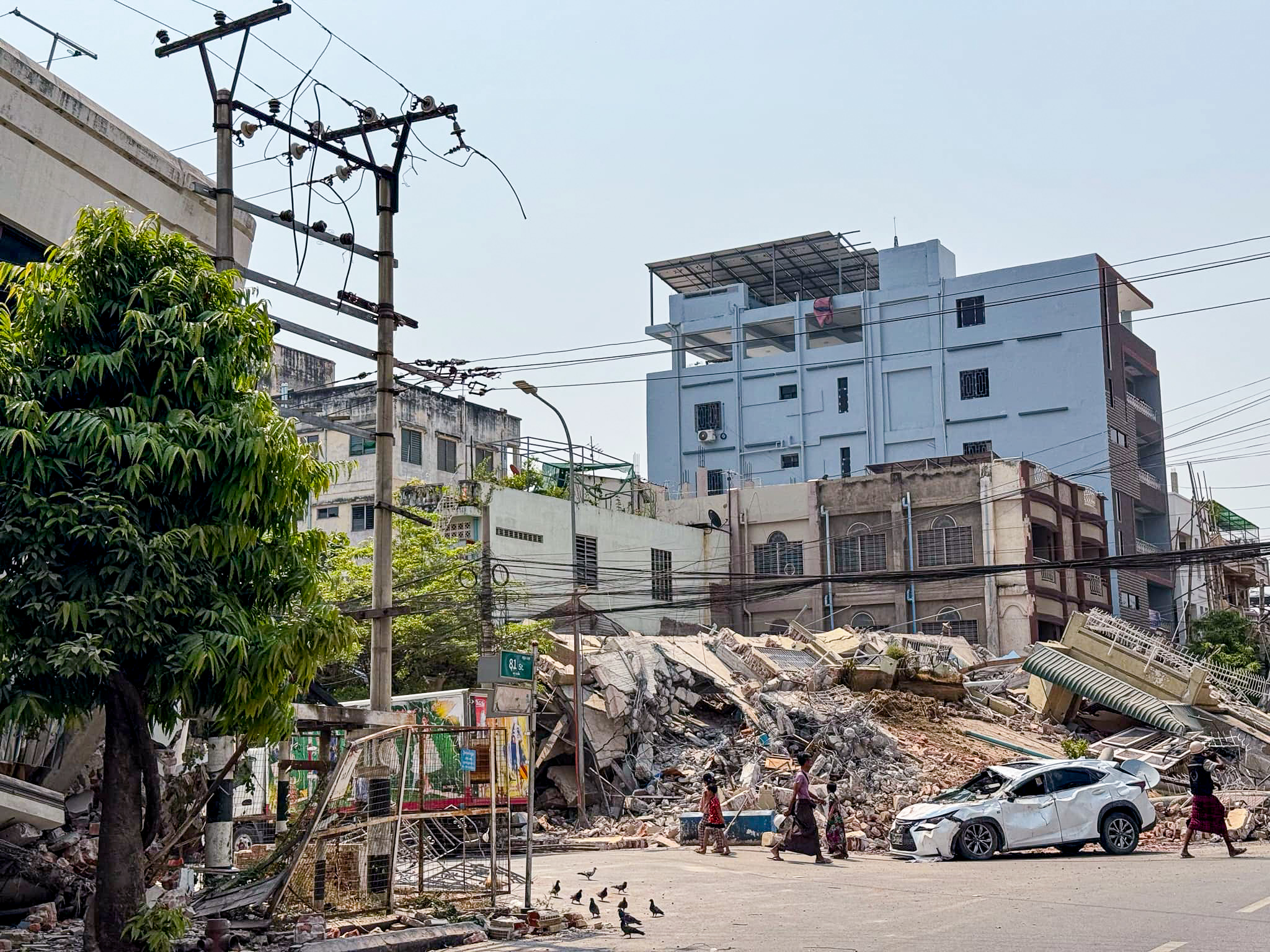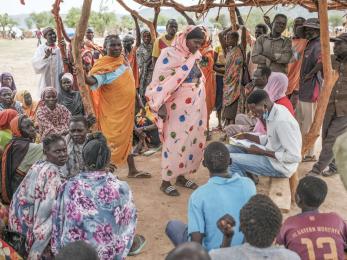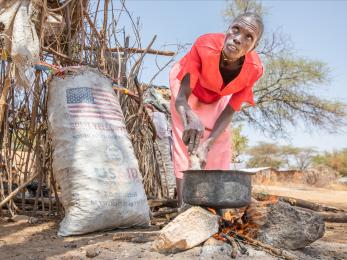Q&A: How we're protecting Syrian refugee kids

Children who have escaped Syria still carry the emotional scars of war, and now face new struggles as refugees. Many are not able to go to school and are crowded into tents and abandoned buildings with nowhere to play. In such desperate circumstances, boys are forced to work and girls are at risk for sexual exploitation.
“Children have really lost an anchor for normalcy, a means for coping with the trauma, and also hope for the future,” explained Alexandra Chen, Regional Child Protection Advisor for our work with Syrian refugee children in Jordan and Lebanon.
Here, she tells us what their life is like and what Mercy Corps is doing to keep them safe, now and in the future.
Q: What did children experience in Syria?
Alexandra Chen: The last days in Syria are perhaps the most difficult for refugees to talk about — both for the children and the parents. All of them have experienced loss and witnessed much violence and destruction.
For many children, the sound of bombs and gunfire continues to haunt them. And almost all of the children have experienced death as well — many have seen dead people, either killed before them or bodies littering the street.
Some have seen their parents or their brothers and their sisters killed, tortured or raped in front of them. To witness your figures of protection and honor physically and emotionally violated before your eyes is horrifying and deeply destroys one's sense of safety.
Q: How does this kind of trauma affect them?
Trauma, particularly what therapists call "big T trauma," whether physical or emotional, overwhelms the brain and sends it into our fight, flight or freeze survival response. The brain is unable to make sense of the memory and unexpected things can become triggers in everyday life.
The experience of trauma is thus carried into the present — particularly in a refugee context, where there’s little if any sense of safety or security, and many lack belief that they'll be able to build their future. The brain is desperately trying to make sense of the traumatic memory while trying to protect itself in the present.

Q: How does that manifest in children’s emotions and behaviors?
Many children, especially when they first arrive, behave very aggressively. It's not because these children are violent, but their aggression is often the mind's way of trying to make up for the ways it failed to protect itself during the traumatic event.
Some children also isolate themselves as a means of coping. A crowded refugee camp can be scary for a five-year-old child who has been dragged across the border, surrounded by people pushing and pulling and shoving and shouting and screaming and crying...
One boy would walk out of his family's tent every morning at 3 a.m. and go to our Child-Friendly Space in Zaatari camp and just hide in the corner. His family had no idea. It was just because the stress he was experiencing was so overwhelming that he had to be in a place where he felt safe and just be by himself.
So many children are struggling with profound stress and anxiety — wetting the bed, panic attacks and night terrors — as well as the inability to focus. Their brains are still in survival mode. And many parents are also deeply distressed by the depression and anxiety they see in their children.
Q: What happens if this kind of trauma is not addressed?
On a developmental level, many children are unable to engage in learning. It will be difficult for children to build a future for themselves 3, 5, 10 years from now if they are not able to manage their profound stress and re-engage in learning. Some children have already been out of school for over two years, and it becomes harder to catch up the longer they have not been engaged in learning.
There are also a lot of children struggling to develop healthy bonds — what we call "attachment" — with other people, particularly adults. This will significantly impact their emotional development and personal relationships.
When you consider on this very large scale the number of children who are experiencing this kind of profound stress, a worst-case scenario is that we have a very emotionally unstable population prone to aggression as their means of coping.

Q: How does Mercy Corps help them recover?
Our approach is providing children with as much safety as we can — to give them the space, the skills and the safe adult figures so they move out of survival mode and engage in learning and play.
In the Child-Friendly Spaces we create, we have three goals:
The first is protection. We want the kids to feel physically safe and interact with adults they can trust.
The second is psychological wellbeing, particularly to help them manage their stress. The spaces and activities provide them hope and also the excitement in their daily lives so that they don't resort to coping mechanisms like fighting.
And the third is their healthy social integration. We focus on fostering children's interactions in groups and making friends. We ensure that our staff are present regularly and consistently so the children can count on them and develop healthy attachment. And we’re also establishing a buddy and mentorship system in the spaces, particularly between older youth and the younger children.
The beautiful thing about children, and what Mercy Corps truly believes in, is that children are extraordinarily resilient. While they are victims of the conflict, it is critical for each child to be able to "resource" from within — to identify and draw from his or her own strengths.
Q: What does our work with children look like in Lebanon?
In Lebanon, there are no refugee camps for Syrians and there's little sense of community or social support among the refugees. Kids are encouraged to stay indoors, and there is no room to play at all.
So we are offering our Comfort for Kids and Moving Forward programs in local schools, Social Development Centers and other institutions that provide us space in their off-hours. Children attend sessions several times a week on a regular basis. For many, it is the only structured activity and opportunity to interact with friends that they have.
Q: Explain how Comfort for Kids and Moving Forward are being used.
Comfort for Kids is a workbook-based activity that is designed to help children express themselves and tell their stories. The booklets are in Arabic and each child has their own. Our staff work with them one-on-one through the writing and drawing activities that ask: Who are you? What do you like to do? What makes you special? What do you hope for? We also have a team of psychologists who help identify children with extreme emotional distress or PTSD who need special attention or counseling.
Often as refugees, the children get treated as a huge mass of people, and their own needs are forgotten. It’s important that engage with them as individuals, so they feel their stories and dreams are valued, and that their lives are not on hold.
Moving Forward is more of a sports-based program, with interactive activities that bring both Syrian and Lebanese youth together. The team-building is about boosting self-esteem, developing leadership skills and also promoting a focus on the future.
We’re also doing mobile activities out in the communities, including photojournalism and videography workshops. We believe it's important for them to document that every day matters, and it's not just 24 hours of waiting to go home or waiting for an uncertain future.
SEE A FILM BY THE YOUTH: It Won't Be Long!
The goal is that these activities help move young people out of a state of anxiety and get them motivated to think about, “How should I be investing in myself as an individual and in my friends and in a community so that every day of my life counts?”

Q: And what about in Jordan?
Our project with UNICEF has been building playgrounds in the various refugee camps. We bring in "animators" to lead diverse activities with the children. There is storytelling, a room with toys and Legos, various arts and crafts, and many indoor and outdoor games, including an area for building sandcastles. One of the spaces at Zaatari, called Dream Land, also has a movie theater that the kids love.
Child-Friendly Spaces are ultimately safe spaces. They are a place for the kids to express their energy, creativity and develop friendships. For children who have experienced so much violence and trauma, we want them to play and be creative — it’s important for their lives to move forward in that way.
The fact that they are shared, communal spaces is also important. They are a place where parents can support each other and see their children having a positive experience, which alleviates their stress and anxiety. Children can develop healthy attachment and trusting relationships with other adults as well. The social support, the building of community is so necessary in the refugee context.
Our UNICEF project is now expanding to the new refugee camp in Azraq, which may open in September. There, we are already building more of Child-Friendly Spaces, and will be starting Comfort for Kids and Moving Forward activities as well.
Q: Are we looking to add any more programs as the number of refugees continues to grow?
We are expanding our work in Lebanon to reach more refugees settled in West Bekaa and the South. In Jordan, we also work in six urban communities outside the camps, where there is just no room to play. Across the board, each one of them has identified the need for a playground, school extension or other community space to bring children together. So we are now helping to support that need and vision.
HOW TO HELP: Your gift helps us reach more children in Jordan and Lebanon
Q: It sounds like a lot of our work is helping children in the absence of school. What is the status of education for refugee children?
All across the board, education has been disrupted.
In Jordan, some schools have been built in the camps, and those in the urban communities are doing double shifts to accommodate Syrians in the afternoons and evenings. But there is a lot of fighting and kids being bullied, so parents I’ve spoken to have taken their kids of out of school for that reason.
In Lebanon, the challenge is often that — if children are even able to get into a classroom — a lot of the schools still teach in French, and in Syria the kids learned in Arabic. Many of the kids are just not able to keep up and get very frustrated in school and basically drop out.
Boys as young as 12 or 13 are now working and responsible for bringing in the income for the family. They are in car mechanic shops, in the back kitchens of restaurants, trying to get jobs in construction —really are doing whatever they can to bring home food and money to pay rent. For such young children to work is completely illegal, but they are finding jobs because they will accept absolutely abysmal pay. We also know that some girls are forced into prostitution or even married off in order to survive.
So the lack of education either has paralyzed the children’s lives or fast-tracked them in disturbing ways.
Q: And considering that we don’t know how long this crisis will last, the implications for these children’s futures could be severe.
Absolutely. If you consider a five-year timeline — and who knows how long this crisis will last — and imagine you are a 13-year-old boy. Your father has been killed in Syria and maybe you have seen your mother attacked in front of you. As the eldest child, you are now responsible for your family and have to make the decision whether or not to stay in your village or flee across the border. This means you may never see your hometown again and you may lose some family along the way.
You become a refugee and are looked down on and yelled at by people who accuse you of stealing their jobs, taking their water and homes and other resources. You put up with physical or emotional abuse just to bring home $5 a day to be able to feed your mother and your five sisters.
Five years down the road, you are 18 years old and you have not received more than a seventh grade education. By that time, you feel there really is no going back, and perhaps the only way you know how to survive is by being incredibly cynical and aggressive in order to defend yourself and your family.
We are deeply concerned that if the emotional and social needs of young Syrian refugees are neglected, we will have a generation of children primed to act violently, because they feel there is nothing to lose. It's an entire generation that could be lost, and we feel responsible to not let that happen.
Q: How can Mercy Corps help prevent that?
There’s an increasing understanding that the psychosocial wellbeing of youth is deeply tied with their ability to manage conflict, both individually and also in their society. Reaching them is a priority, especially in a crisis.
Our programs are designed to provide comfort and a sense of safety first, but we are also very forward looking. We consider what interventions and support we can provide now that will have a lasting impact, say, five years from now.
So we provide activities and communal support to keep kids away from violence and drugs. We train older youth to be caregivers in the Comfort for Kids program and monitors on the playgrounds. Creating a network of local volunteers not only makes the program more sustainable, but it’s also an opportunity for the youth to positively contribute to the wellbeing of their community.
We’re also establishing more child protection committees in Jordan — parents, grandparents, religious leaders, trusted members of the community — who will volunteer to make sure that services for children are available and coordinated. It’s something that we have done in Lebanon, where members are committed to making sure that children are protected from violence, rape and child labor.
Involving caregivers in our child protection programs is an essential way to empower parents in the healing process. They may not have been able to stop their home from being burned down or their spouse from being killed, but that does not mean they are a failure as a parents, and they can very much contribute to the protection of their children and others going forward.


